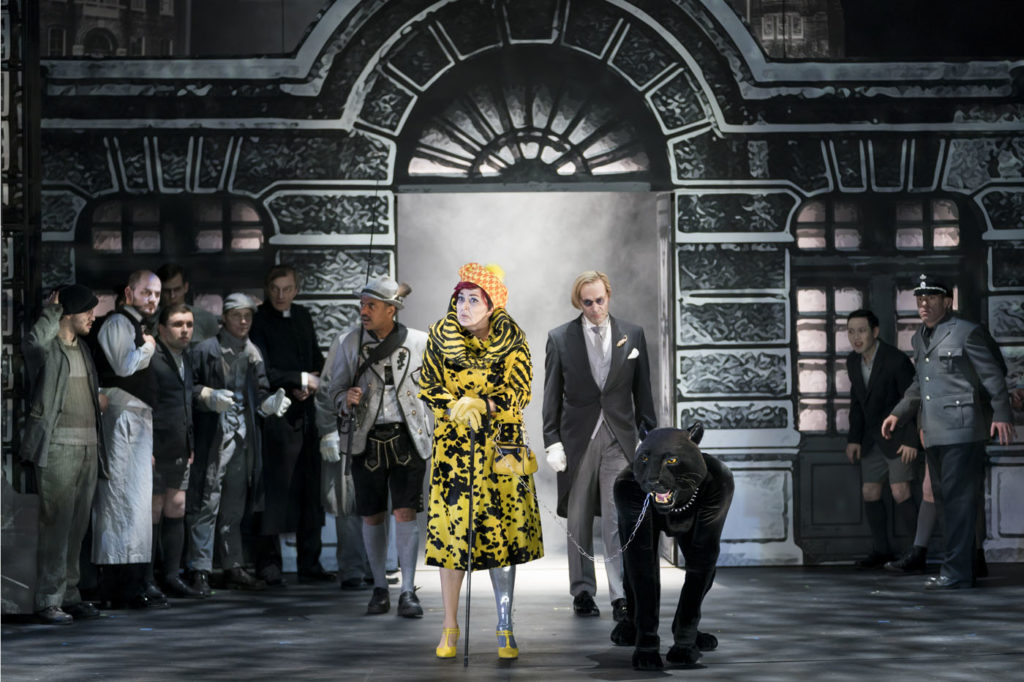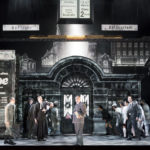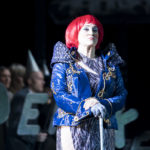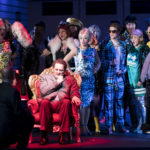 The opera is based on Friedrich Dürrenmatt’s stage play Der Besuch der alten Dame, an international success, filmed (1963) with Ingrid Bergman in the title role. The Visit of the Old Lady is a modern morality tale of small-town greed and hypocrisy- that resonates as well today. The teenage Claire Z, made pregnant by a small businessman, is abandoned and driven out as a whore in Güllen, a town without pity. She returns 50 years later- immensely rich through various marriages. She’s back for revenge, blood money; and meanwhile Gullen has fallen on hard times.
The opera is based on Friedrich Dürrenmatt’s stage play Der Besuch der alten Dame, an international success, filmed (1963) with Ingrid Bergman in the title role. The Visit of the Old Lady is a modern morality tale of small-town greed and hypocrisy- that resonates as well today. The teenage Claire Z, made pregnant by a small businessman, is abandoned and driven out as a whore in Güllen, a town without pity. She returns 50 years later- immensely rich through various marriages. She’s back for revenge, blood money; and meanwhile Gullen has fallen on hard times.
Gottfried von Einem’s opera, with Dürrenmatt’s own libretto, premiered in 1971 at Vienna State Opera, with Christa Ludwig, to triumphant acclaim. Einem’s music is ‘eclectic, varied, rhythmic’ – pushes ‘tonality’ to its limits- but it’s still accessible. I’ve seen the play, heard the ‘soundtrack’, a radio broadcast, and now eagerly anticipated the opera, Theater an der Wien’s new production- celebrating von Einem’s centenary. Well, even though Dürrenmatt collaborated on the libretto, it’s hard to imagine he’d approve of this (Keith Warner) production.
 The opening set- monotone greys- consists of cut-out facades of civic buildings, decrepit, faded grandeur. Lined up are the very respectable inhabitants, all dressed in grey- hateful, smug and self-important. Then we see a poster (cleverly) advertising a puppet show: ‘Der Besuch der alten Dame’. Posters and placards are used for scene changes: next at a railway station, (expecting a train from Stockholm), they’re all waiting feverishly for a VIP.
The opening set- monotone greys- consists of cut-out facades of civic buildings, decrepit, faded grandeur. Lined up are the very respectable inhabitants, all dressed in grey- hateful, smug and self-important. Then we see a poster (cleverly) advertising a puppet show: ‘Der Besuch der alten Dame’. Posters and placards are used for scene changes: next at a railway station, (expecting a train from Stockholm), they’re all waiting feverishly for a VIP.
So far, musically it’s impressive. RSO Wien under Michael Boder, points up the brass section, the shrill wind instruments, and the very prominent drums. It is very well sung, Arnold Schoenberg Choir providing the chorus.
One of the problems is with Warner’s conception. Dürrenmatt’s text is implicitly social critique, but Warner sees it as rabid satire, the Old Lady as a caricature figure. He describes Claire Zachanassian as ‘creepier than the witch in Hansel and Gretel; the embodiment of crass materialism. But this is a misreading. Katarina Karnéus’s Claire is not a sympathetic figure. Yet the Lady is the victim of an amoral, and patriarchal, society. In Dürrenmatt’s parable, she returns to put these censorious bigots to the test; they’ll do anything for money.
Karnéus’s character forfeits our sympathy. She’s so loud; gross like a Dame Edna Everage über creation, a larger than life drag queen (no disrespect!) Karneus’s magnificent mezzo copes nevertheless with the extreme vocal demands. She staggers on in a garish leopard- print coat, brilliant red hair. From baby-blue girls dresses, tied with pink ribbons, her wardrobe goes to new extremes with every scene. And the entourage. Is the black panther, on a leash, for real?  And wearing a diamonte necklace. Koby (Antonio Gonzalez) and Loby (Alexander Linner)- both bald with glasses- are said to have been castrated (Claire’s ‘false witnesses’, now her eunuchs.) Roby and Toby carry her sedan chair. And she has ‘a coffin which might come in handy.’
And wearing a diamonte necklace. Koby (Antonio Gonzalez) and Loby (Alexander Linner)- both bald with glasses- are said to have been castrated (Claire’s ‘false witnesses’, now her eunuchs.) Roby and Toby carry her sedan chair. And she has ‘a coffin which might come in handy.’
The billboard advertises KONRADSWEIL, the date 1955 – 55 years ago when she met Albert III (Canadian tenor Russell Braun), powerfully sung, and sympathetically enacted, Braun’s a dignified, heartfelt performance. He’s married a shop owner called Mathilde (Cornelia Horak) has a son and daughter by her; now he’s trying to charm Claire into investing her money. So he turns on the charm, recalling their romantic times together. Karnéus and Braun’s scenes – especially their duet in Act III – are outstanding, von Einem’s score sounding lyrical, the lush strings recalling Richard Strauss. Braun’s Alfred gets physical, but the Lady – so it seems – isn’t all flesh: has too many other parts.
In Güllen she’s staying in the Golden Apostle Hotel, where there’s a reception of the town’s bigwigs. As the Burgermeister, Raymond Very’s tenor is richly melodious in his welcome. Now, in a dazzling silver outfit, Karnéus’s aria reminds her audience of how she was bullied and humiliated at school; of the paternity suit filed against her; of the witnesses bribed to free Alfred to marry Mathilde. Now she will donate a million to Güllen: but subject to one condition. Justice for what she suffered; one of them must kill Alfred.
In Warner’s version, it’s all about consumerism. But Dürrenmatt’s plays, like The Physicists, are about moral dilemmas; here the conflict is in the sacrifice of human decency for the ‘Golden Calf’. A million to buy justice. Strident clarinets, fierce trombones: hers is the devil’s pact. They must pay their debt.
Act II opens with a mart (Braun’s) offering expensive items on a one-day-only offer. They’re buying the expensive stuff, and buying it on credit: they’ll bankrupt him. The Priest Alfred goes to (Markus Butter’s tremendous bass baritone) advises him to flee. Braun’s Alfred, grey-suited, carrying a suitcase, is intercepted at the station, trying to catch a train.
The staging in Act III is really all too much unless it’s farce you’re into. Except for Karnéus in her contemplative moments. She sings poignantly, it was winter when she left ; she’s come back for just one more time.
Against a Year 2000, Super-Saving-Event poster (price-tags in Swiss francs?), Braun and Karnéus’s scene is affectingly warm – the scoring, gushing strings, and Straussian. Braun sings, he and Mathilde have a child now.
 After the gaudy, trashy sets, the finale ‘Goldene Dusche‘- a festival of bling – is appropriately effective. The neon sign suggests the apocryphal gold raining from heaven: also a golden shower (in S and M terms). Here are plush velvet armchairs , braided in gold. Everyone’s wearing brilliantly coloured designer clothing. ‘Wealth is only justified when it’s foundations are just’… but these upright citizens are deciding whether to accept the golden pay-out.
After the gaudy, trashy sets, the finale ‘Goldene Dusche‘- a festival of bling – is appropriately effective. The neon sign suggests the apocryphal gold raining from heaven: also a golden shower (in S and M terms). Here are plush velvet armchairs , braided in gold. Everyone’s wearing brilliantly coloured designer clothing. ‘Wealth is only justified when it’s foundations are just’… but these upright citizens are deciding whether to accept the golden pay-out.
Braun, dressed in a modest suit, ‘will end a senseless life’. Karnéus sings of a sweeping blue panorama. Your love has been dead for years; her love -she’s just married another husband – is constantly being renewed. Nothing more remains of him than a dead lover- a ghost in a destroyed home. Adieu Alfred.
Braun is escorted from his armchair by a spookily Nazified head of police to a room at the back of the stage. We can barely glimpse the the physical beating. He’s carried out: a heart attack, overdosed on pleasure. Now, finally, the silver coffin at the front of the stage is opened up to take in three black body bags. Adieu Alfred. She, Karnéus, is dressed in black- in a Versace take on a Salvation Army uniform- like an avenging angel.
This Warner production doesn’t help us, give us any insight into the moral compass of the opera. It’s more like a show, a ‘Mormon’ entertainment. His production- Warner explains in the programme interview- is his instant reaction to the contemporary world in moral crisis- the world of Trump Towers, Brexit, Merkel-land. No wonder my neighbour, Viennese, a subscriber- an opera Liebhaber who knows about opera – admitted she didn’t really understand the opera. © PR.18.03.2018
Photos: Katarina Karnéus (Claire Zachanassian), Ernest Allan Hausman (Moby), Mark Milhofer (Boby Butler); Adrian Eröd (Teacher), Markus Butter (Priest), Raymond Very (Bürgermeister), Katerina Karnéus (Claire Z); Russell Braun (Alfred III; Carolina Lippo
© Werner Kmetitsch

Hi there! Someone in my Facebook group shared this website with us so I came to look it over.
I’m definitely enjoying the information. I’m book-marking and will be tweeting this to
my followers! Fantastic blog and brilliant design.
Great content! Super high-quality! Keep it up!
Hello, Neat post. There’s an issue together with your site in internet explorer, may check this?IE still is the marketplace chief and a large element of people will miss your excellent writing due to this problem.